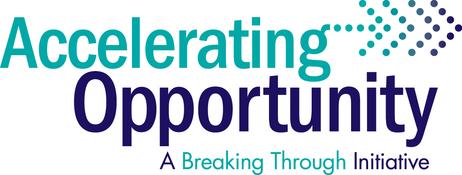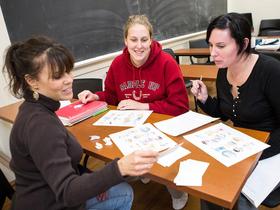Millions of adults in this country do not have the training and education necessary to land good jobs with sufficient pay to support their families. At the same time, businesses are unable to find the skilled workers they need to fill their positions and improve their productivity. To provide a solution to both of these national economic issues, Jobs for the Future (JFF) has announced the launch of their latest program, Accelerating Opportunity: A Breaking Through Initiative, which will provide resources to community colleges nationwide to transform the current adult education system. The changes implemented by this initiative will ensure more adults get the necessary training to move into high-paying jobs and provide the skilled workforce companies need to compete in the global marketplace.
In Want of a Workforce
According to a report at CBS Atlanta, over 26 million adults in this country lack a high school diploma today. A small portion of this number enrolls in adult education classes, hoping to get the education necessary to move ahead in today’s workforce. Unfortunately, many students who enroll in adult education programs drop out after just a semester or two without getting their postsecondary credentials to get the better jobs they originally hoped for. Accelerating Opportunity is designed to change the scenario by reinventing the way adult education is delivered and providing the necessary support to help students succeed.
“The number of adults without skills and credentials beyond high school is a national crisis threatening our economic recovery,” JFF President and CEO Marlene B. Seltzer told CBS Atlanta. “At the same time, employers are having difficulty finding qualified workers to fill skilled positions that command a higher salary. The trend will only continue – by 2018, 70 percent of all jobs will require workers with some form of postsecondary credentials.”
Hilary Pennington, director of Postsecondary Success with the Bill & Melinda Gates Foundation, agrees with Seltzer’s evaluation. Pennington told CBS Atlanta, “This is a serious economic issue, as well as an education issue. There is a mismatch between the high-demand, high-skilled jobs currently available and the skills workers currently have. Accelerating Opportunity links directly with our work in postsecondary education, and most importantly, it will address the needs of a traditionally underserved population on community college campuses.”
The Bill & Melinda Gates Foundation is one of the organizations that has helped fund Accelerating Opportunity. Other contributors include the Joyce Foundation, the W.K. Kellogg Foundation, the Kresge Foundation, and the Open Society Foundations. To help with the design of the program, JFF has relied on the expertise of other organizations like the National Council for Workforce Education, the National College Transition Network, and the Washington State Board of Community and Technical Colleges.
This video offers a history of Minnesota community colleges.
What the Program will Do
According to the Accelerating Opportunity website, the program's primary purpose is to create evidence-based models to promote transition to postsecondary programs in high-demand fields and ensure completion of those programs. To achieve this goal, the organization has devised eight elements that must be incorporated into every Accelerating Opportunity pathway:
- Articulation of two or more pathways that begin with Adult Basic Education or ESL and continue through one year of college training that ends with certification or equivalent credentials
- Determination of demand for the pathways by data that shows a robust demand for a particular area of study within the local workforce
- Acceleration strategies that allow students to earn their credentials as efficiently as possible
- Evidence-based dual-enrollment strategies
- Comprehensive support for adult students on both an academic and social level
- Achievement of marketable certificates and degrees, with a goal of bypassing developmental education
- Award of some college-level professional-technical credits, which are transcripted the quarter they are earned
- Partnerships with Workforce Investment Boards or local employers
All of these elements are considered necessary to ensure the majority of the students within the program increase their basic skills to the point of marketability. When these elements are put in place, the pathway the student chooses should result in success in the majority of cases.
So far, 11 states have been selected to participate in the Accelerating Opportunity program, including Alabama, Georgia, Illinois, Kansas, Kentucky, Louisiana, Mississippi, New Mexico, North Carolina, Oregon, and Wisconsin. These states have all received $200,000 in grant money to redesign their adult education and postsecondary programs. In addition, five of those states will receive additional funding to implement their plans over the next three years. The initiative will ultimately involve as many as 40 community colleges across the country.
This video offers School.com's take on the best community colleges in Illinois.
Schools Ready to Revamp Adult Education
One of the school systems benefiting from the Accelerating Opportunity funding is the Louisiana Community and Technical Colleges System. According to a report at KATC, the money provided by this program will help the school system transform the way adults in the state get their adult education, ensuring greater success for the students enrolled in the program. The new adult education program, dubbed WorkReady U, will provide some of Louisiana’s least educated residents with a path to career success while meeting the demands of the Louisiana workforce.
“We are pleased to have been awarded this grant and what it will mean for our continuing efforts to transform adult education in Louisiana,” LCTCS President Dr. Joe D. May told KATC.
Central Piedmont Community College is another school prepared to make the most of the Accelerating Opportunity grant funding. According to the college website, this North Carolina school is hoping to use the money to increase credential attainment for adult students. Accelerating Opportunity is part of Central Piedmont’s Pathways to Employment program.
The community college environment continues to change and improve, and hopefully, this initiative will help many adult learners capture the skills they need to earn solid salaries in highly demanded jobs.
Questions? Contact us on Facebook. @communitycollegereview















